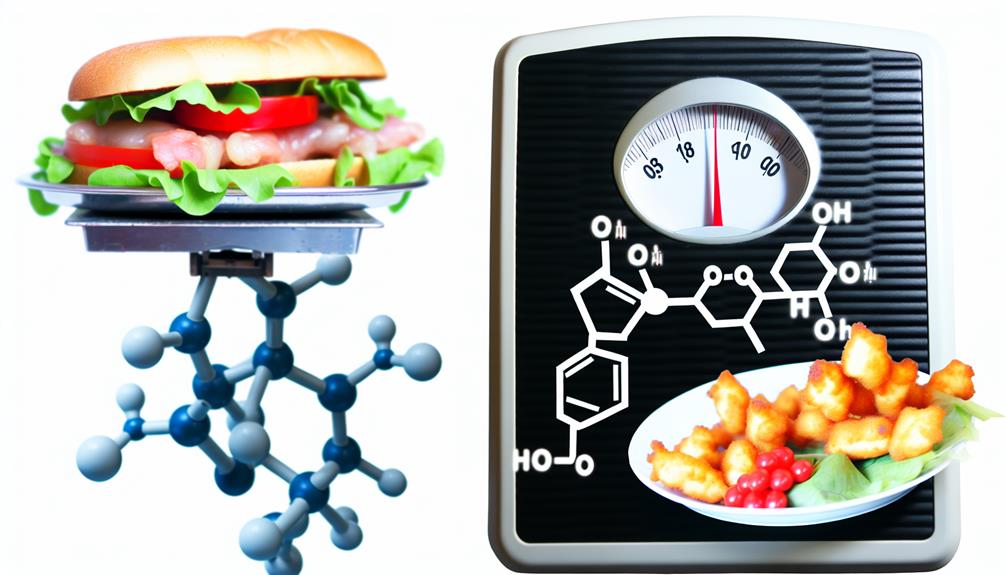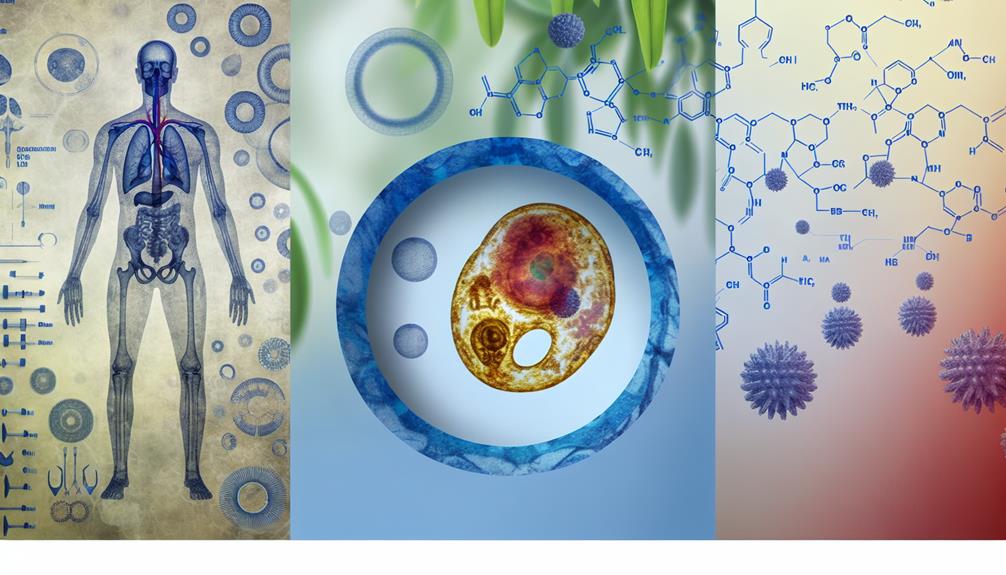When it comes to male hormone imbalances, several medical conditions can play a significant role. I see that hypogonadism leads to inadequate testosterone production, contributing to fatigue and decreased libido. Obesity can also increase estrogen levels, further impacting hormone balance. Chronic stress raises cortisol, disrupting testosterone regulation. Additionally, sleep apnea affects testosterone while elevating cortisol levels. Conditions like diabetes and thyroid disorders also reduce testosterone production. Testicular injury can result in low hormone levels, affecting energy and mood. Understanding these conditions is essential for effective management and treatment; there's much more to explore about their implications and solutions.
Hypogonadism

Hypogonadism, a condition marked by inadequate hormone production, can profoundly impact a man's health and well-being. I've observed that symptoms often include fatigue, decreased libido, and loss of muscle mass. These manifestations can lead to a diminished quality of life and increased psychological distress. The underlying causes of hypogonadism can vary, ranging from genetic factors to chronic illnesses or even injury to the testes.
In evaluating hypogonadism, I focus on measuring serum testosterone levels, typically through a morning blood test. When testosterone levels are consistently low, it's essential to explore potential treatment options. One of the most effective interventions is testosterone therapy, which involves administering testosterone to restore hormonal balance. This therapy can come in various forms, such as injections, transdermal patches, or gels.
The goal of testosterone therapy is to alleviate the symptoms associated with hypogonadism and improve overall health. However, it's essential to monitor the patient closely for potential side effects, which can include erythrocytosis, sleep apnea, and increased prostate-specific antigen levels.
An integral part of managing this condition is hormone replacement therapy, which can enhance not only physical attributes but also psychological well-being. By restoring testosterone levels, I've seen improvements in energy, mood, and sexual function. To summarize, effective management of hypogonadism through testosterone therapy can greatly enhance a man's quality of life, but it requires careful consideration and monitoring to mitigate associated risks.
Diabetes Mellitus
Diabetes mellitus is a prevalent condition that can considerably disrupt hormonal balance in men. As I investigate this topic, it's vital to understand how insulin resistance and metabolic syndrome interplay with hormonal levels. This condition can lead to reduced testosterone production, which in turn exacerbates health issues such as fatigue, depression, and diminished libido.
When I analyze the relationship between diabetes and hormonal imbalance, it's evident that men with insulin resistance often experience alterations in their hormonal profiles. Metabolic syndrome, characterized by a cluster of conditions including high blood pressure, high blood sugar, and abnormal cholesterol levels, can further complicate this relationship. Here's a summary of how these factors interact:
| Condition | Effect on Hormones | Potential Outcome |
|---|---|---|
| Insulin Resistance | Decreases testosterone levels | Fatigue, muscle loss, depression |
| Metabolic Syndrome | Increases estrogen relative to testosterone | Weight gain, sexual dysfunction |
| Diabetes Mellitus | Heightens cortisol levels | Stress, anxiety, sleep issues |
| Combined Effects | Further hormonal dysregulation | Increased risk of chronic diseases |
Understanding these dynamics is essential for managing diabetes-related hormonal imbalances. It highlights the importance of monitoring and addressing insulin resistance and metabolic syndrome to maintain hormonal health. As we explore treatment options, we must consider lifestyle changes and medical interventions to restore balance and improve overall well-being in affected men.
Obesity

Obesity represents a significant health challenge that profoundly impacts hormonal balance in men. I've observed that excess body fat, particularly visceral fat, can lead to increased estrogen levels while simultaneously reducing testosterone. This hormonal imbalance can manifest in various ways, including decreased libido, fatigue, and mood changes. The underlying mechanisms involve adipose tissue's role in hormone metabolism, as fat cells convert androgens into estrogens, further exacerbating the imbalance.
To address this issue, I recommend implementing lifestyle changes that target weight reduction and overall health improvement. Regular physical activity is essential; I've found that engaging in both aerobic and resistance training can effectively enhance testosterone levels while reducing body fat.
Moreover, dietary modifications play a significant role in managing obesity and its hormonal effects. A balanced diet rich in whole foods, lean proteins, healthy fats, and low in processed sugars can help regulate insulin sensitivity and promote weight loss. I often advise focusing on portion control and mindful eating practices to prevent overeating, which is critical for sustainable weight management.
In my experience, addressing obesity requires a multifaceted approach that combines both lifestyle changes and dietary modifications. By actively working to reduce body weight, men can improve their hormonal balance, leading to enhanced physical and mental well-being. It's essential to recognize that these changes take time and commitment, but the long-term benefits are clearly worth the effort.
Thyroid Disorders
Recognizing the intricate relationship between thyroid function and male hormone balance is important for understanding hormonal health. The thyroid gland plays a significant role in hormone regulation, affecting not only metabolism but also testosterone levels. When thyroid function is compromised—whether through hypothyroidism or hyperthyroidism—men can experience significant hormonal imbalances.
Hypothyroidism, characterized by an underactive thyroid, can lead to decreased testosterone production. Symptoms often include fatigue, weight gain, and depression, which can further exacerbate hormonal issues. Conversely, hyperthyroidism, where the thyroid is overactive, can cause elevated testosterone levels but may lead to a decrease in overall hormone stability, creating a precarious state for male health.
To clarify the impact of thyroid disorders on male hormone balance, consider the following table:
| Condition | Effect on Thyroid Function | Consequences for Male Hormones |
|---|---|---|
| Hypothyroidism | Reduced hormone production | Decreased testosterone |
| Hyperthyroidism | Increased hormone production | Fluctuating testosterone levels |
| Thyroiditis | Inflammation of the thyroid | Potentially unstable hormone levels |
Understanding these dynamics is essential. Should you experience symptoms suggestive of thyroid dysfunction, it's important to consult a healthcare provider for appropriate testing and treatment. In doing so, you can work towards restoring hormonal equilibrium and promoting overall health.
Chronic Stress

While thyroid disorders can considerably impact male hormone balance, chronic stress presents another layer of complexity in this intricate hormonal web. I've observed that chronic stress can markedly alter cortisol levels, the stress hormone produced by the adrenal glands. Elevated cortisol levels, sustained over time, can lead to a cascade of biochemical reactions that disrupt the delicate equilibrium of testosterone and other hormones.
When I experience chronic stress, whether from work pressure or personal issues, my body enters a heightened state of alert, leading to increased cortisol production. This mechanism, while beneficial in acute situations, becomes detrimental when stress persists. Prolonged high cortisol levels can inhibit the production of testosterone, which is essential for numerous bodily functions, including mood regulation, muscle mass maintenance, and libido.
Additionally, I've come to realize that stress management plays a important role in mitigating these effects. Techniques such as mindfulness, physical exercise, and adequate social support can help lower cortisol levels and restore hormonal balance. By consciously addressing stressors and adopting effective coping strategies, I can protect my hormonal health.
Sleep Apnea
Sleep apnea notably affects hormone levels, particularly testosterone, which can lead to various health issues. I've observed that the symptoms often include fatigue and mood changes, complicating the diagnosis process. Understanding the available treatment options is essential for managing both sleep apnea and its hormonal impacts.
Impact on Hormone Levels
In the context of sleep apnea, the disruption of normal breathing patterns during sleep can considerably alter hormone levels in the body. I've observed that the intermittent hypoxia resulting from apneic episodes leads to significant fluctuations in testosterone levels. Studies indicate that this condition can exacerbate the decline of testosterone, which plays a pivotal role in various bodily functions, including mood regulation and muscle mass maintenance.
Moreover, the impact of sleep apnea extends beyond testosterone. Cortisol, the stress hormone, often elevates due to the body's response to disrupted sleep. This heightened cortisol can further exacerbate hormone imbalances, leading to a cycle of physiological distress.
To mitigate these effects, I've found that lifestyle changes can be incredibly beneficial. Implementing regular exercise routines and maintaining a healthy weight are critical strategies. Additionally, dietary adjustments—such as reducing sugar intake and increasing omega-3 fatty acids—can support hormonal health. By addressing sleep apnea through these measures, one can often restore a more balanced hormonal profile, enhancing overall well-being and quality of life.
Symptoms and Diagnosis
Identifying the symptoms of sleep apnea is essential for early diagnosis and intervention. This condition can greatly affect hormone levels and overall health. As I look at the risk factors, I realize that lifestyle factors and age-related changes can exacerbate the symptoms.
Here are three common symptoms I've observed in those with sleep apnea:
- Loud Snoring: This is often the most noticeable symptom, typically reported by bed partners. It's not just annoying; it signals disrupted breathing during sleep.
- Excessive Daytime Sleepiness: I've seen individuals struggling to stay awake during the day, which can impact work performance and daily activities.
- Morning Headaches: Many people experience headaches upon waking, which can be linked to oxygen deprivation during sleep.
Recognizing these symptoms early can lead to appropriate diagnostic measures, such as a sleep study. Understanding the interplay between lifestyle factors, like obesity or smoking, and age-related changes is essential. These insights help in addressing the root causes of sleep apnea, ensuring that we approach the situation with a thorough perspective.
Treatment Options Available
Recognizing the symptoms of sleep apnea sets the stage for exploring various treatment options that can markedly improve quality of life. After a thorough diagnosis, I've found that addressing sleep apnea often requires a multifaceted approach.
Lifestyle changes play an essential role. Regular exercise, weight management, and avoiding alcohol can considerably diminish symptoms. Additionally, maintaining proper sleep hygiene and practicing nasal breathing techniques are beneficial.
For those seeking natural supplements, options like melatonin and magnesium can support better sleep quality. However, it's important to consult a healthcare provider before starting any supplements to guarantee they align with individual health needs.
Here's a concise table summarizing common treatment options:
| Treatment Option | Description |
|---|---|
| Lifestyle Changes | Weight loss, exercise, and sleep hygiene |
| CPAP Therapy | Continuous positive airway pressure device |
| Oral Appliances | Devices that reposition the jaw during sleep |
| Natural Supplements | Melatonin and magnesium for sleep support |
It's essential to evaluate these options in collaboration with a healthcare professional to create a tailored treatment plan. By addressing sleep apnea effectively, you can enhance overall well-being and restore hormonal balance.
Testicular Injury

Testicular injury can greatly disrupt hormonal balance in men, often leading to a cascade of health issues. When I think about how such injuries can affect testosterone levels and overall reproductive health, it's clear that conditions like testicular torsion must be taken seriously. Testicular torsion occurs when the spermatic cord becomes twisted, cutting off blood supply to the testicle. This can lead to significant damage if not treated promptly.
The repercussions of testicular injury are multifaceted, and I want to highlight three vital effects:
- Hormonal Imbalance: An injury can lead to a decline in testosterone production, resulting in low energy, mood swings, and decreased libido.
- Sperm Production Issues: Injuries can directly impact sperm production. Damage to the testicular tissue may reduce sperm count, affecting fertility.
- Increased Risk of Complications: If not addressed, injuries may lead to chronic pain or require surgical intervention, further complicating hormonal balance.
Understanding the seriousness of testicular injury is essential for maintaining male reproductive health. If you're experiencing any symptoms such as pain or swelling in the testicular area, it's vital to consult a healthcare professional. Early intervention can prevent long-term issues related to hormonal imbalance and fertility, ensuring that your reproductive system remains healthy and functional. Ignoring these signs could lead to irreversible damage, emphasizing the need for awareness and prompt medical attention.
Frequently Asked Questions
Can Lifestyle Changes Improve Hormone Balance in Men?
Absolutely, I believe that lifestyle changes can greatly improve hormone balance in men. Incorporating regular exercise provides numerous benefits, like enhancing mood and boosting energy levels, which can positively influence hormone production. Additionally, effective stress management techniques, such as mindfulness and relaxation exercises, help reduce cortisol levels, promoting a healthier hormonal environment. By focusing on these areas, I've noticed substantial improvements in my overall wellbeing and hormone stability.
Are There Specific Symptoms of Hormone Imbalance in Younger Males?
Did you know that about 25% of younger males experience symptoms related to hormone imbalance? In my experience, testosterone deficiency can lead to fatigue, while estrogen dominance might cause mood swings. I've also noticed that adrenal fatigue often presents as low energy and stress, alongside potential thyroid dysfunction, which could manifest as weight changes. Recognizing these symptoms is essential, as they considerably affect overall health and well-being in young men.
How Do Medications Affect Male Hormone Levels?
When I consider how medications affect male hormone levels, I find that different medication types can lead to hormonal side effects. For instance, some antidepressants and steroids may lower testosterone levels, while others might disrupt the balance of estrogen and testosterone. It's essential to monitor these changes, as they can influence mood, libido, and overall health. Always consult a healthcare professional to understand the implications of any prescribed medication on hormone levels.
What Role Does Diet Play in Hormone Regulation?
Diet plays an essential role in hormone regulation, and I've found that dietary influences can greatly impact my overall hormonal balance. My food choices, particularly those rich in healthy fats, proteins, and micronutrients, help support ideal hormone production. For instance, incorporating omega-3 fatty acids and zinc has been beneficial. Additionally, I've noticed that processed foods can disrupt hormone levels, emphasizing the importance of mindful eating in maintaining hormonal health.
Are Hormone Replacement Therapies Safe for All Men?
As the saying goes, "a stitch in time saves nine." When considering hormone replacement therapy, it's essential to weigh the hormone therapy risks involved. Not every man will benefit equally, and individual health factors play a significant role. I've found that adhering to safety guidelines set by healthcare providers can mitigate potential complications. Ultimately, consulting with a knowledgeable physician guarantees that any therapy aligns with personal health goals and minimizes risks effectively.
